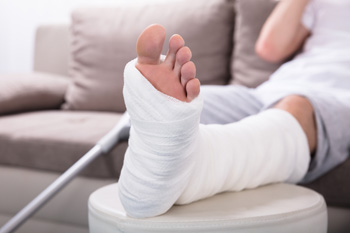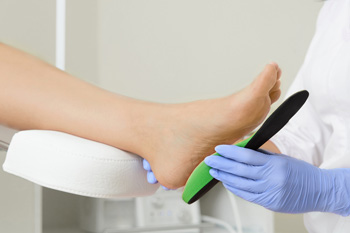Garner (919) 661-4150
February 2021
Are Bunions Affecting Your Everyday Life?
Understanding Stress Fractures in the Feet
 Stress fractures are tiny hairline fractures that are usually the result of the foot no longer being able to handle the loads and weight that are being placed on it. Issues such as overtraining or overuse, improper training, wearing improper footwear, foot deformities, and osteoporosis can all lead to stress fractures. Stress fractures are usually indicated by pain, swelling, redness, and bruising. If left untreated, they can lead to complete breaks. Patients who believe that they are suffering from a stress fracture should be under the care of a podiatrist to get a proper diagnosis and treatment. Treatment options include rest and immobilization, and in severe cases, surgery may be necessary.
Stress fractures are tiny hairline fractures that are usually the result of the foot no longer being able to handle the loads and weight that are being placed on it. Issues such as overtraining or overuse, improper training, wearing improper footwear, foot deformities, and osteoporosis can all lead to stress fractures. Stress fractures are usually indicated by pain, swelling, redness, and bruising. If left untreated, they can lead to complete breaks. Patients who believe that they are suffering from a stress fracture should be under the care of a podiatrist to get a proper diagnosis and treatment. Treatment options include rest and immobilization, and in severe cases, surgery may be necessary.
Stress fractures occur when there is a tiny crack within a bone. To learn more, contact Chukwuma Ukata, DPM from Advanced Carolina Foot and Ankle Center. Our doctor can provide the care you need to keep you pain free and on your feet.
How Are They Caused?
Stress fractures are the result of repetitive force being placed on the bone. Since the lower leg and feet often carry most of the body’s weight, stress fractures are likely to occur in these areas. If you rush into a new exercise, you are more likely to develop a stress fracture since you are starting too much, too soon. Pain resulting from stress fractures may go unnoticed at first, however it may start to worsen over time.
Risk Factors
- Gender – They are more commonly found in women compared to men.
- Foot Problems – People with unusual arches in their feet are more likely to develop stress fractures.
- Certain Sports – Dancers, gymnasts, tennis players, runners, and basketball players are more likely to develop stress fractures.
- Lack of Nutrients – A lack of vitamin D and calcium may weaken the bones and make you more prone to stress fractures
- Weak Bones – Osteoporosis can weaken the bones therefore resulting in stress fractures
Stress fractures do not always heal properly, so it is important that you seek help from a podiatrist if you suspect you may have one. Ignoring your stress fracture may cause it to worsen, and you may develop chronic pain as well as additional fractures.
If you have any questions, please feel free to contact our office located in Garner, NC . We offer the newest diagnostic and treatment technologies for all your foot care needs.
Psoriatic Arthritis Can Affect the Feet
 Each foot consists of several bones, ligaments, and tendons. The skin on the feet differs from the rest of the body by being thicker and having numerous sweat glands. This is helpful in monitoring the impact that occurs from walking and standing for the majority of the day. Psoriasis is a medical condition that can cause the feet to become arthritic. It can cause severe pain and discomfort, and may be recognized by noticing yellow and white areas on the feet that are filled with pus. The symptoms of psoriatic arthritis can include pain in the ankle joints, and it may be difficult to point and flex the foot. If you have symptoms of arthritis in the feet, it is strongly suggested that you are under the care of a podiatrist who can effectively help you to manage this condition.
Each foot consists of several bones, ligaments, and tendons. The skin on the feet differs from the rest of the body by being thicker and having numerous sweat glands. This is helpful in monitoring the impact that occurs from walking and standing for the majority of the day. Psoriasis is a medical condition that can cause the feet to become arthritic. It can cause severe pain and discomfort, and may be recognized by noticing yellow and white areas on the feet that are filled with pus. The symptoms of psoriatic arthritis can include pain in the ankle joints, and it may be difficult to point and flex the foot. If you have symptoms of arthritis in the feet, it is strongly suggested that you are under the care of a podiatrist who can effectively help you to manage this condition.
Arthritis can be a difficult condition to live with. If you are seeking treatment, contact Chukwuma Ukata, DPM from Advanced Carolina Foot and Ankle Center. Our doctor can provide the care you need to keep you pain-free and on your feet.
Arthritic Foot Care
Arthritis is a joint disorder that involves the inflammation of different joints in your body, such as those in your feet. Arthritis is often caused by a degenerative joint disease and causes mild to severe pain in all affected areas. In addition to this, swelling and stiffness in the affected joints can also be a common symptom of arthritis.
In many cases, wearing ill-fitting shoes can worsen the effects and pain of arthritis. Wearing shoes that have a lower heel and extra room can help your feet feel more comfortable. In cases of rheumatoid arthritis, the arch in your foot may become problematic. Buying shoes with proper arch support that contour to your feet can help immensely.
Alleviating Arthritic Pain
- Exercises that stretch the foot can prevent further pain and injury and increase mobility
- Most of the pain can be alleviated with anti-inflammatory drugs, heat, and topical medications
- Massages can help temporarily alleviate pain.
It is best to see your doctor for the treatment that is right for your needs and symptoms. Conditions vary, and a podiatrist can help you determine the right method of care for your feet.
If you have any questions, please feel free to contact our office located in Garner, NC . We offer the newest diagnostic tools and technology to treat your foot and ankle needs.
What Are Orthotics?
 Orthotics are inserts that are worn inside of the shoes to correct issues with foot deformities, foot alignment, or to relieve pressure from various foot conditions. Orthotics can help relieve foot pain, knee pain, and lower back pain as well. There are 3 common types of orthotics including: soft, rigid, and semi-rigid. Soft orthotics are designed to cushion the foot when planted on the ground. Semi-rigid orthotics are designed to provide a middle ground between stability and cushioning and are often used for patients with flat feet. Rigid orthotics are designed to control movement in the foot that causes pain. If you believe that orthotics may be right for you, please consult with a podiatrist for professional advice. A podiatrist will custom make your orthotics to maximize your experience.
Orthotics are inserts that are worn inside of the shoes to correct issues with foot deformities, foot alignment, or to relieve pressure from various foot conditions. Orthotics can help relieve foot pain, knee pain, and lower back pain as well. There are 3 common types of orthotics including: soft, rigid, and semi-rigid. Soft orthotics are designed to cushion the foot when planted on the ground. Semi-rigid orthotics are designed to provide a middle ground between stability and cushioning and are often used for patients with flat feet. Rigid orthotics are designed to control movement in the foot that causes pain. If you believe that orthotics may be right for you, please consult with a podiatrist for professional advice. A podiatrist will custom make your orthotics to maximize your experience.
If you are having discomfort in your feet and would like to try orthotics, contact Chukwuma Ukata, DPM from Advanced Carolina Foot and Ankle Center. Our doctor can provide the care you need to keep you pain-free and on your feet.
What Are Orthotics?
Orthotics are inserts you can place into your shoes to help with a variety of foot problems such as flat feet or foot pain. Orthotics provide relief and comfort for minor foot and heel pain but can’t correct serious biomechanical problems in your feet.
Over-the-Counter Inserts
Orthotics come in a wide variety of over-the-counter inserts that are used to treat foot pain, heel pain, and minor problems. For example, arch supports can be inserted into your shoes to help correct overarched or flat feet, while gel insoles are often used because they provide comfort and relief from foot and heel pain by alleviating pressure.
Prescription Orthotics
If over-the-counter inserts don’t work for you or if you have a more severe foot concern, it is possible to have your podiatrist prescribe custom orthotics. These high-quality inserts are designed to treat problems such as abnormal motion, plantar fasciitis, and severe forms of heel pain. They can even be used to help patients suffering from diabetes by treating foot ulcers and painful calluses and are usually molded to your feet individually, which allows them to provide full support and comfort.
If you are experiencing minor to severe foot or heel pain, it’s recommended to speak with your podiatrist about the possibilities of using orthotics. A podiatrist can determine which type of orthotic is right for you and allow you to take the first steps towards being pain-free.
If you have any questions please contact our office located in Garner, NC . We offer the newest diagnostic and treatment technologies for all your foot and ankle needs.
What Can Cause an Ingrown Toenail?
Ingrown toenails can occur from a sudden injury, genetics, or from wearing shoes that do not fit correctly. Additionally, ingrown toenails can develop if the toenails are cut improperly. The big toe is most frequently affected. Common symptoms that are often associated with this ailment include reddened skin surrounding the ingrown nail, tenderness, and pain. This is a result of the nail growing into the skin. If the area becomes infected, drainage may ooze from the sides of the nail. Some patients find it beneficial to soak their toe in warm water, as this may help to soften the affected area enough to separate the nail from the skin. It is strongly suggested that you consult with a podiatrist if you have an ingrown toenail.
Ingrown toenails may initially present themselves as a minor discomfort, but they may progress into an infection in the skin without proper treatment. For more information about ingrown toenails, contact Chukwuma Ukata, DPM of Advanced Carolina Foot and Ankle Center. Our doctor can provide the care you need to keep you pain-free and on your feet.
Ingrown Toenails
Ingrown toenails are caused when the corner or side of a toenail grows into the soft flesh surrounding it. They often result in redness, swelling, pain, and in some cases, infection. This condition typically affects the big toe and may recur if it is not treated properly.
Causes
- Improper toenail trimming
- Genetics
- Improper shoe fitting
- Injury from pedicures or nail picking
- Abnormal gait
- Poor hygiene
You are more likely to develop an ingrown toenail if you are obese, have diabetes, arthritis, or have any fungal infection in your nails. Additionally, people who have foot or toe deformities are at a higher risk of developing an ingrown toenail.
Symptoms
Some symptoms of ingrown toenails are redness, swelling, and pain. In rare cases, there may be a yellowish drainage coming from the nail.
Treatment
Ignoring an ingrown toenail can have serious complications. Infections of the nail border can progress to a deeper soft-tissue infection, which can then turn into a bone infection. You should always speak with your podiatrist if you suspect you have an ingrown toenail, especially if you have diabetes or poor circulation.
If you have any questions, please feel free to contact our office located in Garner, NC . We offer the newest diagnostic and treatment technologies for all your foot care needs.








